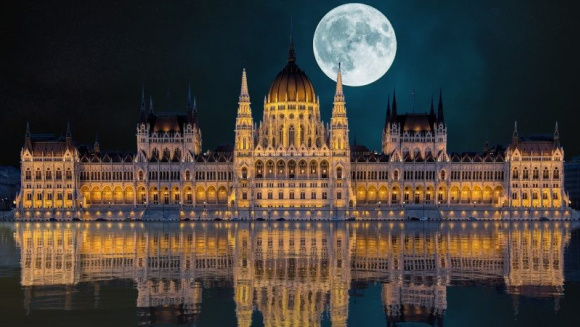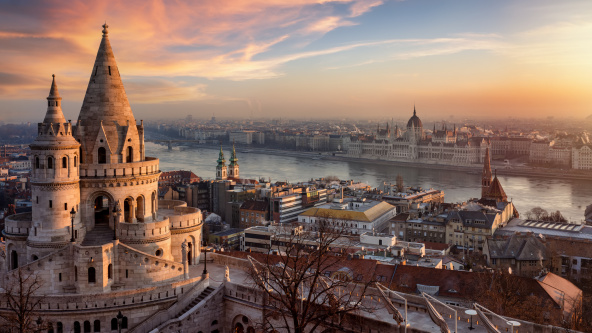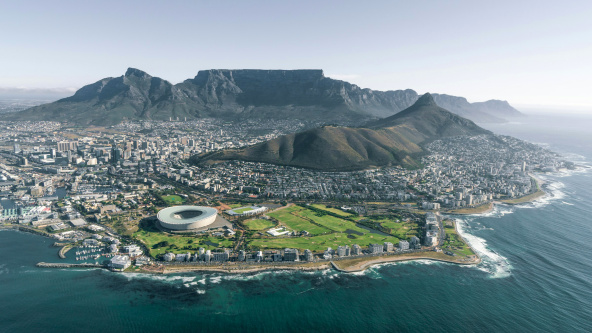Living in Budapest: an expat guide

What to expect when moving to Budapest
Expatriates generally have a great time in Budapest, but there is always a feeling that they are on the outside and never really connect with true Hungarians and their culture. For the older generation of Hungarians, the communist years have left a legacy of distrust of foreigners and, together with the difficult language, many people do not integrate at all. Hungarians can seem arrogant and even gruff when they may only be shy or wary.
Learning Hungarian
Hungarian may be the mother tongue of about 13 million people, but for a large majority of foreigners, it is quite impenetrable. This Finno-Ugric language is not only very complex, it is quite different from the majority of European romantic languages. Not being able to remotely understand what someone is saying to you can be as frustrating as it is intimidating.
English is spoken fairly widely in Budapest amongst the younger generations but many Hungarians do not have any fluency in English. Although some brave foreigners do take on learning Hungarian and studiously attend lessons, many give up along the way simply because it is so difficult to learn. Unfortunately, this can create a huge barrier to ever totally integrating into life in this beautiful city.
The charm of Budapest
Worryingly, the architecture of Budapest is rapidly crumbling and decaying after so many years of neglect, corrosive lead-fuelled air pollution, unrestored war damage, and successive ‘takeovers’ throughout history. But many of the remaining baroque and fin de siècle buildings are eclectic and incredibly lovely through their grime, giving Budapest great charm and making it worthy of the old name ‘Paris of the East’.
Weather and climate
Long, sunny, and very hot summer days usually go through June, July, and August, and often continue through September. BBQs are frequently planned and there is a focus on eating outdoors. The heat can become oppressive during high summer but generally, it is bearable. Pavement cafes are open all over Budapest and restaurants usually have terraces/gardens for outdoor eating.
Autumn comes and goes very quickly – about three weeks in October – but it is an artist’s dream as the colours and light are amazing, especially up in the Buda hills. Winters are long and cold. November brings the cold and dark evenings and December usually brings the snow – although a white Christmas is not always guaranteed. As temperatures fall nightly to about minus 10 and below, the snow, once here, tends to stay for a long time. But that is more than made up for by the usually clear blue skies and sunshine most days.
The hills of Buda become a tobogganing heaven during the snow – but be warned, they are not all safe and accidents occur often. Cafes become warm and cosy places selling hot wine and hot chocolate, sometimes beside open fires but always in ‘overcompensated’ heated interiors. It is not unusual to wear a T-shirt and jeans under a fur coat here. Spring is short and usually starts in April – the signs of green leaves are always welcome after a long winter.
Where to live in Budapest
The beautiful Danube (only truly blue when reflecting a clear blue sky) divides this beautiful city into two: Buda on the hilly west bank where most expats (especially the ones with children) choose to live and Pest on the flat east bank which is more of a ‘working/business’ area.
Since the end of communism, lots of new and large houses have been built and continue to be built in the residential areas of Buda. These are beautiful detached houses with gardens and some have swimming pools. However, rents can be very high and generally speaking Hungarian landlords are not the most reliable when it comes to fixing things which invariably go wrong.
Many of the remaining baroque and fin de siècle buildings are eclectic and incredibly lovely through their grime, giving Budapest great charm and making it worthy of the old name ‘Paris of the East’.
Generally, there are fabulous places (houses and apartments) to be found near schools and transport but a few checks into your landlord beforehand may save a lot of headaches further down the line. Once again, the language can be a barrier and you will need someone to relay your complaints/requests for you.
Living outside the city
You will certainly get much more for your money further out of Budapest, but one major thing to bear in mind when finding your new home is the snow in winter. As Buda is full of hills and Hungarian side roads can be both steep and less than perfect, it is common to be ‘snowed in’ for sometimes lengthy periods. If you live on a bus route the roads will be cleared very efficiently, if not, that pretty little winding road going up the hill in summer will most certainly change into a skating rink over the winter – leaving you unable to drive out and quite isolated.
Most people live in individual apartments or houses although a few people live in purpose-built housing compounds – these tend to be further out of Budapest.
Getting started in Budapest
Healthcare
English-speaking doctors are available in Budapest with a few very comprehensive (but incredibly expensive) medical centres mainly on the Buda side. Local hospitals tend to be very old-fashioned and it is highly unusual for nurses to speak English and not all doctors do either.
Orthodontics and dentistry are excellent but insurance is necessary.
Finding home help
Many foreigners employ cleaners. It is still relatively cheap to have someone come in and it is usually through ‘word of mouth’ in the community that the names of cleaners are passed on. Babysitters are also usually found through word of mouth.
Day-to-day living in Budapest
Getting around
Public transport is amazingly efficient with – albeit very old and decrepit-looking vehicles at times – trams, trolleybuses, regular buses, and an underground ‘tube’ system. One of the biggest drawbacks is that you cannot pay as you get on transport here. Small kiosks at some Metro stations sell booklets of 10 or 20 tickets and monthly passes are also available for everyday use. Tickets must be validated at the beginning of each journey. Be aware that on-the-spot checks are frequent, with fines for those who have not validated their ticket.
Meeting new people
Socially, Budapest is what you make it. Some say there is a ‘small town’ feeling to life. To a certain extent, this is true – cultural and language differences with the Hungarians and their (sometimes) reluctance to make friends with foreigners means that almost everyone in this community knows everyone.
There are several groups for foreign nationals, including the North American Women’s Association (NAWA) and the British Chamber of Commerce (BCCH). There’s also a small theatre group called Budapest English Theatre for those looking for an English-speaking crowd. There are a few English Roman Catholic church communities, a Scottish church, and various other religious affiliations that hold regular church services in English. International schools usually organise community events, Christmas fairs, and international festivals, and are a great way to meet people.
Where to go and what to see
Even after so many centuries of political struggle and upheaval, museums give glimpses of Budapest’s rich and glamorous past and the streets are full of stunning Baroque buildings slowly emerging from their grim and careless past. The Opera House is absolutely beautiful and a delight to everyone who visits it. Even if you are not an opera lover, a trip there is a must. Season tickets are available and prices are very low compared to elsewhere in Europe. A box for six people for the Christmas ballet performance of ‘The Nutcracker’ (always a sell-out ) is a treat worth repeating every year.
The last word
Living as an expat in Budapest can be great fun; even the difficulty of mixing with the local population helps draw the small expat community together and provides good friends and a busy social life. The city does have real charm, without a doubt, and the old ‘Magyar magic’ will appear if you are patient.
If you’re looking for a school abroad, our expert consultants can advise on all aspects of international education, from schools to local educational scenes.
Discover moreTags: Family



